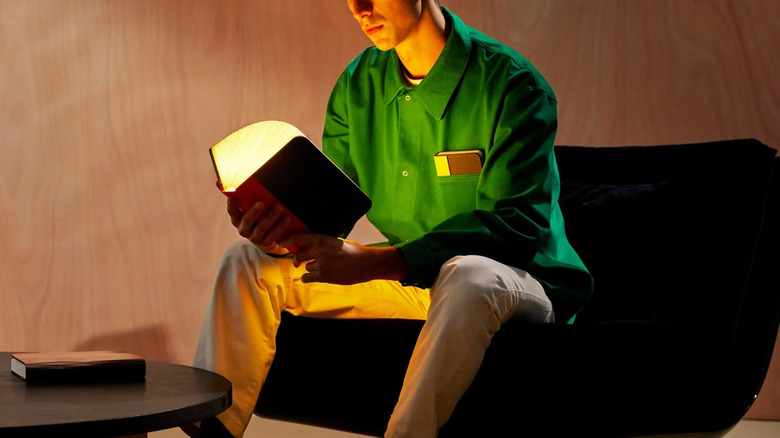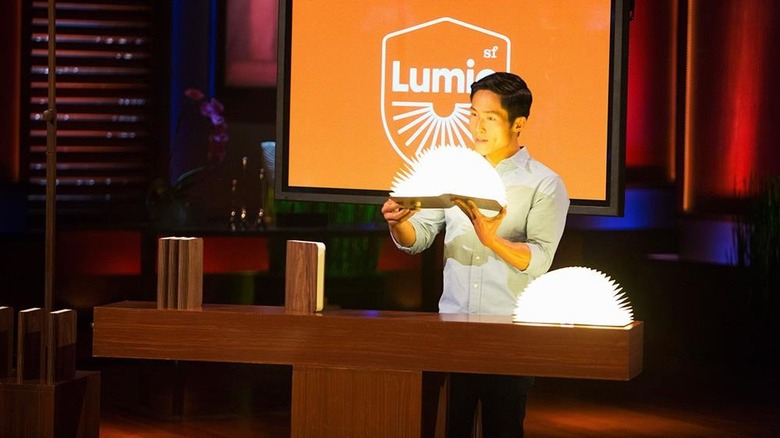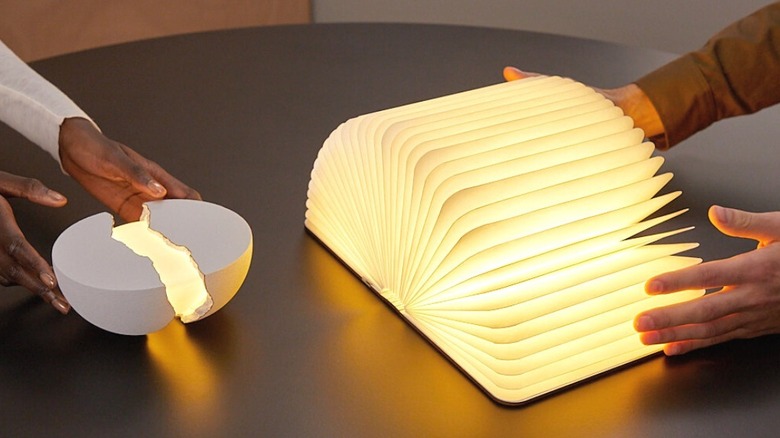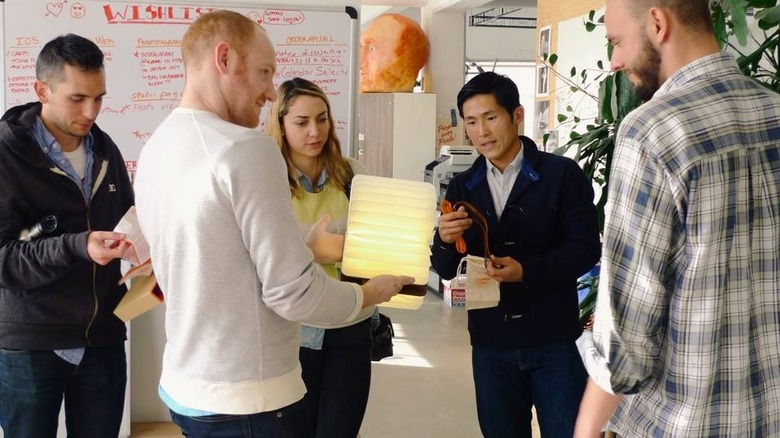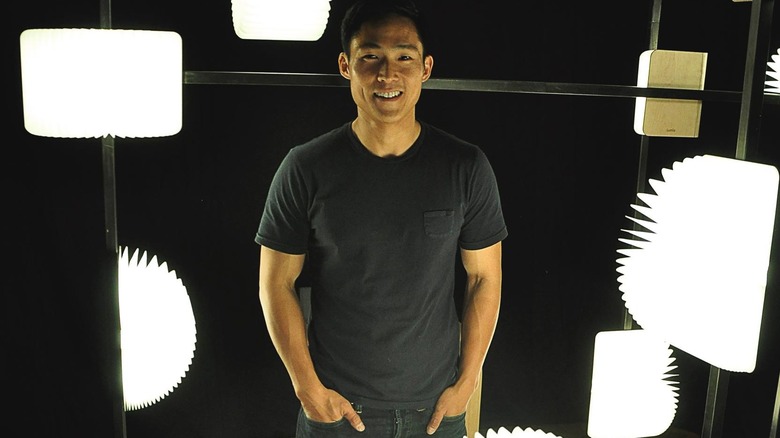Whatever Happened To Lumio - Lighting That Unfolds Like A Book After Shark Tank Season 6?
We may receive a commission on purchases made from links.
Lightbulbs have made almost every aspect of our daily lives much easier, but it can seem like we've reached our limit when it comes to innovative and statement lighting solutions. That is until Max Gunawan invented Lumio, a portable, rechargeable, and adjustable light that looks ever so elegant in your home. Shaped like a hardcover book, the Lumio light opens up to 360 degrees for full radiant light that shines from between the pages. You can also lay the book open on a surface for soft upward ambient lighting or stand it on a table for directional task lighting. Magnets on the cover allow the book to stick to any metal surface, too.
While the Lumio was useful for home use, travelers, and outdoor enthusiasts alike, Gunawan struggled to meet product demands and connect with more retailers. To help fund his novel lighting idea, he brought the Lumio onto season 6 episode 15 of "Shark Tank." But would Gunawan be able to shed enough light on his invention to convince any judges to invest? In one of the rarest moments in "Shark Tank" history, lightbulbs sparked over everyone's heads. Here's what happened on "Shark Tank" and how Lumio blazed a trail after the episode.
What happened to Lumio on Shark Tank?
Max Gunawan cut to the chase rather quickly, requesting $250,000 in exchange for 8% equity in his company, Lumio. Lumio had already made $1 million that year and raised nearly $580,000 on Kickstarter when their goal was just $60,000. Gunawan expected the company to make at least $2 million by the end of the year. One by one, the judges' faces lit up as they opened their own glowing books. The Sharks were very impressed with Gunawan's product, but nobody expected just how impressed they'd be.
In one of the rarest situations ever seen on "Shark Tank," every Shark wanted in on Gunawan's idea. Robert Herjavec was the first Shark to speak up, offering $250,000 for 10%. Kevin O'Leary offered the $250,000 in exchange for a $7 royalty on each product sold until $500,000, plus a 4% stake in the company. Mark Cuban proposed $500,000 for 16%. Lori Greiner offered $250,000 for 12% equity plus a $250,000 line of credit that Gunawan could draw from as needed. The final Shark, Daymond John, offered a shocking $750,000 for 20%, plus a $10 million line of credit. While Gunawan was still thinking, Herjavec suddenly sweetened the deal to $350,000 for 10%, which Gunawan accepted. "I cannot believe all five Sharks made an offer, and I'm very, very excited, especially to work with Robert," he concluded after leaving the tank, "He's exactly who I wanted to partner with and I got a great deal from him."
Lumio after the episode
Contrary to Max Gunawan's excitement about working with Robert Herjavec, the deal they made on "Shark Tank" was never actually finalized. While he didn't settle the deal with Herjavec, there's no doubt that the "Shark Tank effect" still helped Gunawan catch the attention of viewers, consumers, and retailers. It seems that Gunawan didn't truly need help to turn Lumio into a wildly successful business; the products he created really spoke for themselves.
Since introducing Lumio on "Shark Tank," the company has developed a handful of new products. At the time the episode was filmed, Gunawan was working on a prototype for the Lumio mini, a smaller and more portable version of the lamp that could double as a power bank for recharging devices. The full-sized book light is now called the Lito, and Lumio offers the Lito classic, Lito mini, and limited edition styles featuring unique artwork. The Lito classic and mini also come in more colors and styles than originally created, but the warm, white light remains the same. Lumio has also launched the Teno, a sculptural Bluetooth speaker and lamp that uses intuitive touches to change volume, brightness, and more.
Is Lumio still in business?
As it turns out, Lumio is still in business and incredibly successful. While the deal with Robert Herjavec never closed, Lumio still pulls in about $5 million annually as of 2025. Max Gunawan still sells the Lito, Lito mini, limited edition Lito, and Teno Bluetooth speaker on the Lumio website. He has also secured connections with hundreds of retailers worldwide, including Lightology, Amazon (although products are currently unavailable), and several famous museum stores.
In addition to its business success, Lumio also maintains active social media pages and is highly involved in popular technology and architecture circles. "As we mark Lito's tenth birthday, we feel endlessly grateful to everyone who's shared their fondness for it over the years," the company shared in a January 2023 Facebook post, "From the very beginning, our book lamp has never failed to spark joy in people." What once started as a humble idea in Gunawan's workshop would go on to win him praise from several media outlets and multiple awards from Red Dot Design, Cannes Lions, The Chicago Athenaeum, and more.
What's next for Lumio?
Part of what makes the Lito and Teno so beautiful is their simplicity, but perhaps more features and upgrades will come in the future. Some changes might include light color options, more cover styles, or increased battery life, but it seems that Lumio and Gunawan are mostly moving on to more expansive ideas. "What began with a beautiful light became a bigger vision to explore all the senses," the company shared on Facebook, "Lito gave way to Teno, our reinvention of the speaker. And progress is already underway on our next product, which will engage a new sense entirely."
Lito represents sight while Teno represents sound, and from information given on Lumio's website, the next product will engage the sense of touch. The company hints at an upcoming third product coming in 2025 that will "change the very way we sit." The company also writes that they have started brainstorming designs for the fourth sense, scent, and will eventually delve into taste, a relatively unexplored idea in technology.
While we await those new sense-themed products, Lumio also launched an adjustable seesaw-like sculpture of a desk lamp in 2024 called Ovo. For the reveal, Gunawan highlighted the consistent focus of function and art, explaining that Ovo "invites you to find balance — and in the process, to illuminate your space in a way that's truly unique."
